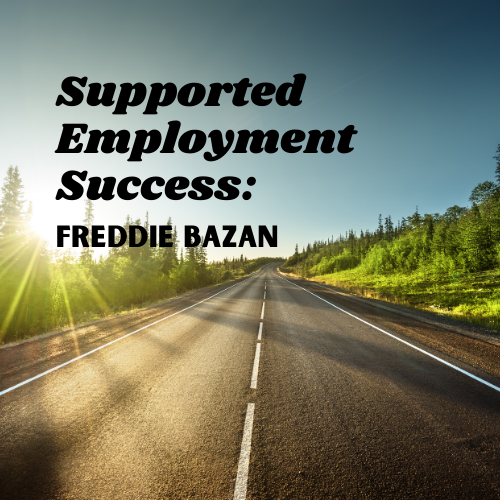
Supported Employment Success: Freddie Bazan
Lifeline Connections’ Supported Employment program helps people find competitive employment. That means a real job in the community at a prevailing wage. Then, once a person becomes employed, individual follow-along supports continue for as long as the person wants and needs it.
Freddie’s story
Freddie Bazan began part-time work with PepsiCo – Frito Lay in July 2019. He continues to participate in Supported Employment for job retention support and long-term career planning. In addition to letters of support from a Clark County Superior Court Recovery Support Specialist and a Therapeutic Specialty Courts Clinician, the Supported Employment Supervisor, Debbie Peabody gave a letter of recommendation.
Letters of recommendation
In this letter she wrote, “Freddie’s strengths include his eagerness to learn and improve, dependability, perfect attendance and is always on-time and ready to work on any task given to him.” Debbie helped Freddie with writing his essay-like answers to a comprehensive questionnaire about his legal history, rehabilitation and complete the Work Opportunity Tax Credit forms. Many apply for work with Frito Lay, but few get the job. So when the e-mail finally came it told him, “you are clear of all background contingencies” and “are now ready for onboarding” Freddie felt a sense of accomplishment that he had not had in a long time.
Steps with supported employment
There’s a lot of organization that goes into getting a job; from the start developing a resume, to the first day of new hire orientation. In Freddie’s case, becoming employed took teamwork and he said, “every little bit helps.” He came to monthly collaborative support sessions with Debbie and the WA State DSHS Division of Vocational Rehabilitation (DVR) Counselor, Helen Christensen. Helen was able to provide Freddie with supports including the required work clothes and a bus pass after becoming employed. “For almost a year, I have had the privilege of working with Mr. Freddie Bazan and have found him to be a respectful, responsible person,” Helen wrote in her letter of reference for him before his case was complete.
Motivation
“What is motivating you to desire work?” is a question on the program referral. Freddie answered, “mainly for retirement. I need a retirement plan.” Post-employment supports help to encourage Freddie to stay focused on his goal to advance his career within the Frito Lay company, obtain a full-time position and become eligible for company benefits including a 401(k) retirement plan.
“They [employment specialists] helped me keep my job. And, helped me in a lot of ways with my self-esteem. They helped me out with job applications, because I wouldn’t have gotten nothing done. And what if something happens and I need help keeping my job? I don’t know what I would do. Plus, I want to get my CDL and apply for the Long-Haul Driver position for Frito Lay, hopefully in the future. And, I don’t know how or where to get that,” he says. Moreover, Freddie plans to continue receiving employment supports until he achieves his career goal.
Looking back
Life seemed unmanageable for Freddie before he enrolled in the program. He explains, “I was in the worst of shape. I hadn’t been to a doctor forever, I was pretty much homeless, I hit the worst of the worst. My parents had just died. Everything was the worst time of my life. I was working making trusses, but I wasn’t really able to keep the job. I was homeless and working. And, I got arrested. When I got out, I went through Drug Court.”
Other new roles
This year, Freddie accepted the house lead role at his recovery residence where he’s helping others early in their recovery with ideas on how to find a job and lets them know that having a job, having something to go do every day is life-changing.
Freddie said what he likes best about his job is, “they let me work by myself without supervision. I got benefits from Frito Lay like free clothes and free chips, I just got a sweater from Frito Lay, a real nice one! I feel like I got an actual job, you know, a job where I don’t have to live paycheck to paycheck once I get full-time.” He also describes the improvement in his decision making skills, “I’m bankrupt, so I had to choose if I was going to renew auto insurance when I got paid. Before, I wouldn’t have gotten auto insurance, but now I think if I don’t have it and get pulled over, I’d end up in jail and there goes my job, there goes everything. It’s a lot cheaper in the long run and in the short run, and so I got the insurance.”
When his friends and family ask what they think of his job, Freddie says, “they all try to get hired there.” He would like others to know that this program not only helped him obtain a job, but also, “to be self-supportive. Take care of my health. Positive thinking. I’m not homeless. It changed everything. I have a future now!” Further, prior to the COVID-19 pandemic, which closed many of our community resources, Freddie was making progress toward earning a G.E.D. which he hopes to continue as soon as they start offering classes.
